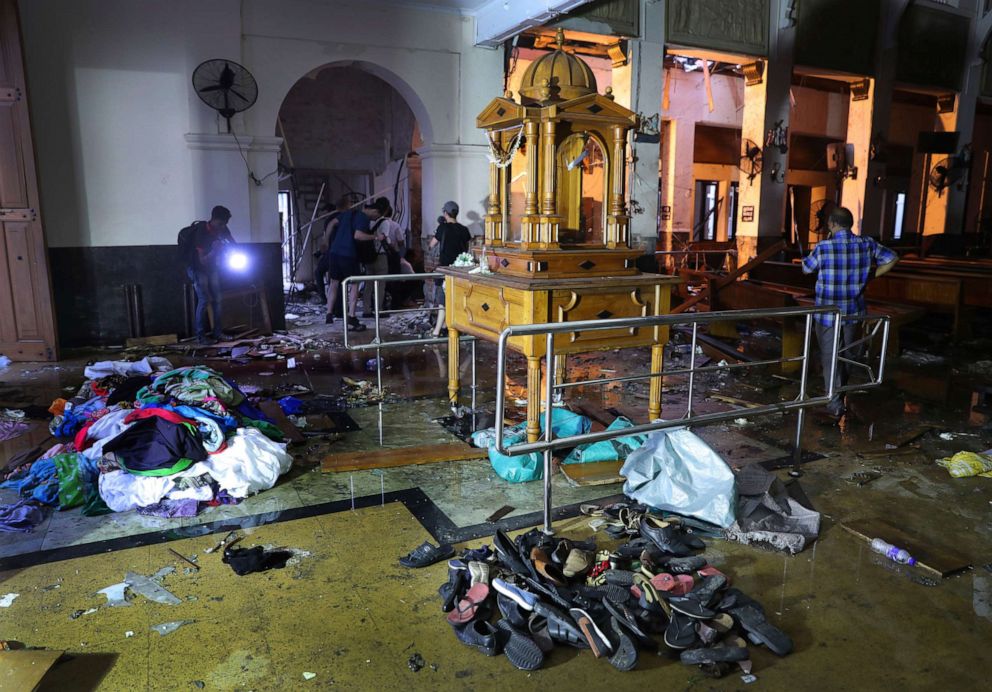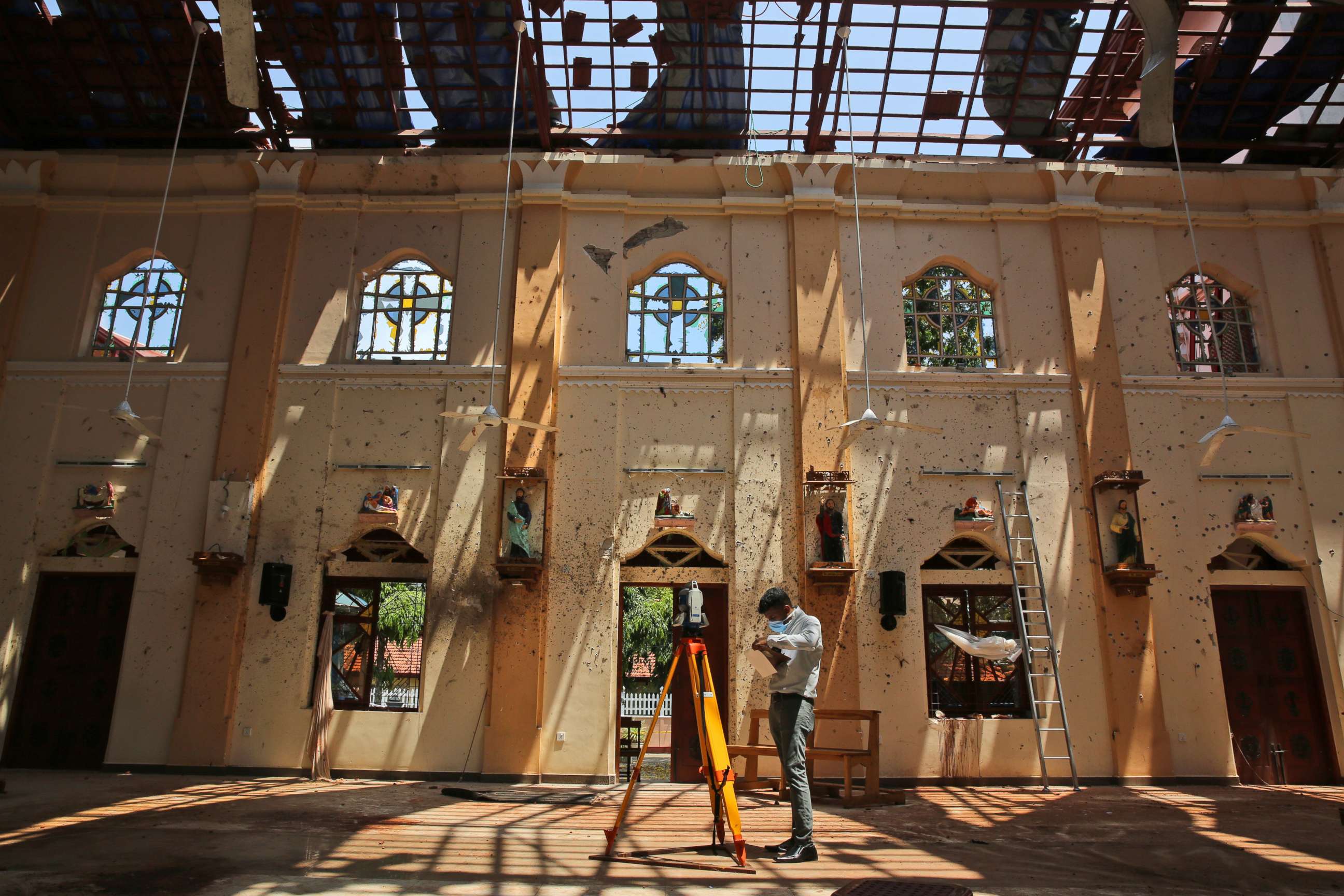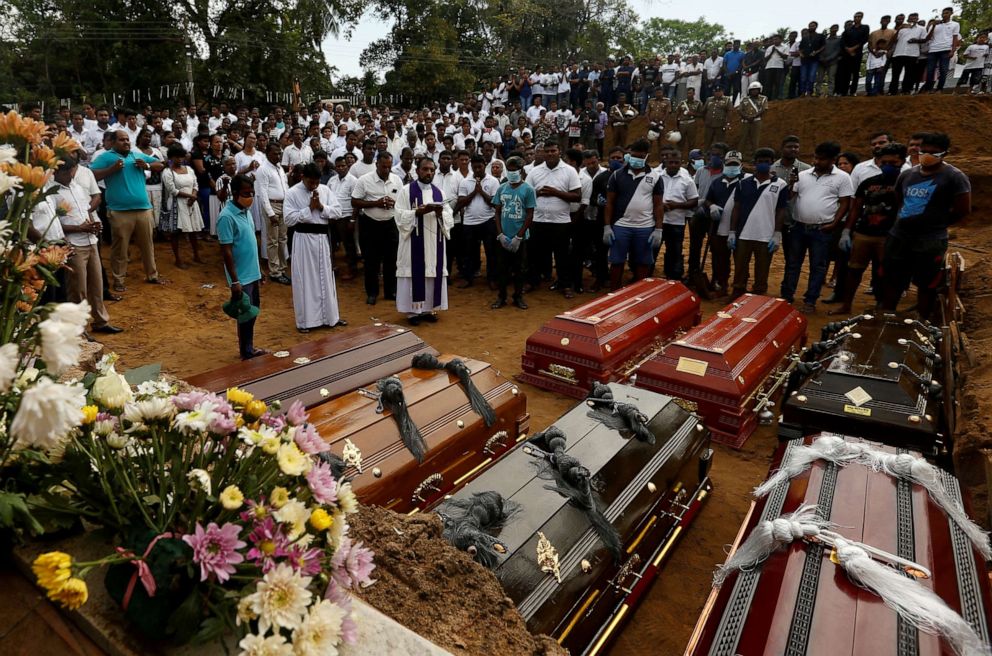Sri Lanka bombing suspects exchange gunfire with soldiers, 15 found dead, police say
Sri Lankan authorities were conducting an operation in the area.
LONDON -- A shootout erupted in eastern Sri Lanka on Friday night between security forces and suspects linked to the string of suicide bombings that has claimed hundreds of lives, according to Sri Lankan police.
The exchange of gunfire happened as security forces were conducting an operation at a suspected safe house in Kalmunai, a city on the island nation's east coast. Three explosions, believed to be suicide bombings, erupted during the shootout, police said.
Fifteen people, including six children, were found dead after authorities entered the safe house Saturday morning, according to The Associated Press. One civilian was also killed.
At least 60 people, all of whom are Sri Lankan, have been arrested so far in connection to last Sunday's massacre.
Sri Lankan Prime Minister Ranil Wickremesinghe told the AP in an interview Thursday that there were suspects still at large and they may be armed with explosives.

At least 253 people were killed and scores more were injured on April 21 when near-simultaneous explosions took place at various locations across Sri Lanka, a largely Buddhist country located off the southern tip of India. Sri Lankan authorities on Thursday revised the death toll down from 359, blaming the chaotic bombing scenes for the discrepancy.
Explosions erupted at three churches holding Easter services in Colombo, the country's capital, as well as Batticaloa and Negombo. Blasts also tore through three upscale hotels in Colombo, including some that are popular among Western tourists, according to Sri Lankan police.
Hours after the initial bombings, another explosion rang out at a housing complex in Dematagoda, a suburb on the outskirts of Colombo, police said.
Later that night, the Sri Lankan Air Force initiated a controlled explosion of a 6-foot-long pipe bomb that was detected on a road near Colombo International Airport, according to Sri Lanka Air Force spokesman Gihan Seneviratne.
A fourth hotel was targeted in a failed attack that day, according to Sri Lankan Prime Minister Ranil Wickremesinghe.
The United States sent a team of FBI agents and military officials to help Sri Lankan authorities with the ongoing investigation. Intelligence units from Australia, India, the United Arab Emirates, the United Kingdom and the International Criminal Police Organization are also assisting.

Most of the explosions last Sunday were detonated by suicide bombers, according to Sri Lanka's junior defense minister Ruwan Wijewardene.
Eight of the nine suicide bombers have been identified so far and one of them was a woman. Most of them came from middle- and upper-middle class families, with some holding academic degrees and possibly having studied in various countries before returning to Sri Lanka, according to Wijewardene.
"They're quite well-educated people," he told reporters at a press conference Wednesday in Colombo.
According to Wijewardene, the suicide bombers had splintered away from a little-known local extremist Muslim group, National Towheed Jamaar, and another group which he identified only as "JMI." The former was earlier blamed for the deadly blasts by Sri Lanka's health minister.

Police said Mohamed Zahran, the leader of National Towheed Jamaar, was killed in one of the suicide bombings last Sunday and his second-in-command has been arrested.
Two sources briefed on the Sri Lanka investigation told ABC News that local authorities have informed U.S. officials that the suicide bombs appear to all have had the same construction, suggesting a single individual who may have been responsible for making them. The explosive devices all used ball bearings as shrapnel, were command-initiated and the detonators were held in the right hands of the bombers, the sources told ABC News.
Investigators believe the lead coordinator behind the attacks was outside of Sri Lanka at the time, the sources said.
Australian Prime Minister Scott Morrison told reporters Friday that the assailants in Sri Lanka had support from the Islamic State group, which has claimed responsibility for the deadly attacks.
ABC News' Alexandra Faul, Ben Gittleson, Angus Hines, Dragana Jovanovic, James Longman, Josh Margolin, Elizabeth McLaughlin, James Meek, Kirit Radia, Bruno Roeber, Nadine Shubailat and Alex Stone contributed to this report.




